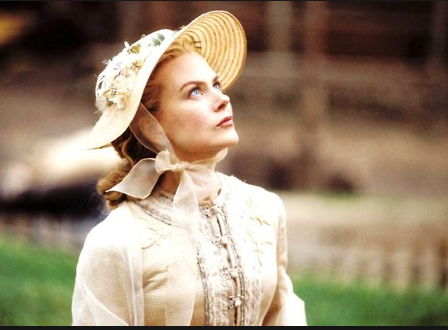Every Piece of This War is Man's Bullshit: The Women of Cold Mountain
 I never miss a Civil War film. Cold Mountain?? I saw it in the theater years ago - and it took me three days to get through it the second time around. You can make what you want from that comment.
But despite my not so subtle thumbs down, I still find this film worth speaking about, simply because I find so many things troubling about it. In other words - expect more than one post about Cold Mountain.
I never miss a Civil War film. Cold Mountain?? I saw it in the theater years ago - and it took me three days to get through it the second time around. You can make what you want from that comment.
But despite my not so subtle thumbs down, I still find this film worth speaking about, simply because I find so many things troubling about it. In other words - expect more than one post about Cold Mountain.
Today - it's the ladies. I really want to speak about women in this film vis-a-vis Confederate nationalism. All - not some - but ALL of the women in Cold Mountain are outright opposed to the prospect of Confederate independence. I find this particularly odd. Sure, I am willing to concede that some white women in the South opposed the war - or rather - opposed the Confederacy. Of course, this was not the case - not by a long shot.
The film, based on the 1997 best-selling novel of the same title by Charles Frazier, indeed paints an alarmingly one dimensional portrait of the Confederacy's women - and manages to touch all socio-economic bases in the process. A quick rundown of the three central female characters:
Ada Monroe: a refined, sophisticated, well-to-do daughter of a slave-holding Charleston preacher.
Sally Swanger: neighborhood matriarch and the wife of a middling famer.
Ruby Thewes: abrasive, unsophisticated (yet literate) poor white woman.
All three of these women, despite their vast differences, seem very much in tune with one another when it comes to the prospect of Confederate independence - essentially written off in the beginning of the film as man's folly. "Did you get a picture made," Ada asks  Inman, the male protagonist, "with your musket and courage on display?" And in the one of the film's culminating moments (there are several) Ruby sums things up pretty well - "They call this war a cloud over the land - but they made the weather. Then they stand in the rain and say shit it's raining!"
Inman, the male protagonist, "with your musket and courage on display?" And in the one of the film's culminating moments (there are several) Ruby sums things up pretty well - "They call this war a cloud over the land - but they made the weather. Then they stand in the rain and say shit it's raining!"
The truth is that one or all three of these women would have very likely supported independence, even if they had grown weary of war - something the author never develops...but something that was considerably important to a great many women. Yes friends, women may not have had the franchise in the 1860s, but were profoundly involved in the political process. They sent their men to war willingly, and in many cases, insisted their men enlist and fight for the cause. Why you ask? Because they had a stake in a slave-holding (and by the way, patriarchal) society. Independence fit very well within their white southern worldview. Those of you who wish to argue with me on this point may do so in the comments - I admit that I am vastly over-simplifying here.
On one hand the film's sentiment fits neatly with a scholarly approach suggesting the Confederacy did itself in internally - that precisely because women did not support the war effort (and thus independence) the fighting spirit of the new nation collapsed. Authors such as Drew Gilpin Faust and others have offered such analytical conclusions.
But - even a cursory look at the letters and diaries written by women during and shortly after the war suggest otherwise. Many were very much on board with a southern Confederacy and heartbroken when it did not materialize. So...the women in Cold Mountain who pray "the sooner we lose this war, the better" most definitely did not speak for everyone.
With compliments,
Keith